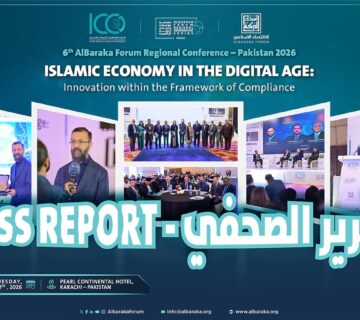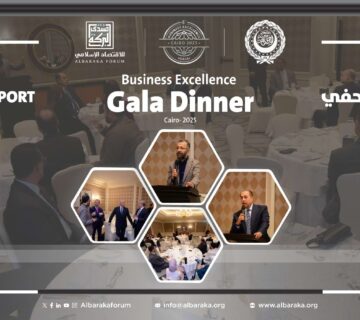His Royal Highness Prince Salman bin Sultan bin Abdulaziz, Prince of Madinah region, honored the opening ceremony of AlBaraka Forum’s symposium of Islamic Economics in its 44th edition. The event was organized under the title “Maqasid of Shari’ah: The Governing Framework of Islamic Economics” on (28 – 29 February 2024) – (18 – 19 Shaaban 1445) corresponding to (Wednesday – Thursday) in University of Prince Mugrin in Madinah, Saudi Arabia, which brought together an elite group of experts and specialists in the fields of economics, finance, and investment.
Dr. Beshir Moafaq, Professor at the College of Shari’ah and Islamic Studies, Qatar University, presented the opening ceremony of AlBaraka Symposium 44 titled “Maqasid of Shari’ah: The Governing Framework of Islamic Economics”, he started by welcoming His Royal Highness Prince Salman bin Sultan bin Abdulaziz, Prince of Madinah region, and the honorable guests, leading for the beginning of the ceremony.
The ceremony kicked off with a royal salute, followed by the recitation of verses from the Holy Qur’an by Sheikh. Yousef Muhammad Ayoub. H.E. Mr. Abdullah bin Saleh Kamel, the Chairman of the Board of Trustees of AlBaraka Forum for Islamic Economy, delivered an opening speech. He reflected on the history of AlBaraka Symposium, which was established 44 years ago by the late businessman Saleh Kamel, may God bless his soul. H.E. Mr. Abdullah Kamel highlighted the importance of the 44th edition of AlBaraka symposium in light of economic changes that necessitate the activation of Maqasid aspects. He emphasized the need to explore various macroeconomic Maqasid of the Islamic economy, rooted in Islamic Shariah, that align with modern economic goals such as reconstruction, security, empowerment, balance, justice, and sustainability.
H.E. Prof. Dr. Saad Al-Shathri, Adviser at the Royal Court and Member of the Council of Senior Scholars, highlighted the significance of the symposium as a contributor to the success of the state under the guidance of the Custodian of the Two Holy Mosques and the faithful Crown Prince. He commended the researchers for their valuable contributions in jurisprudence, economics, and finance, noting the continuous development of the symposium and its positive impact on creating beneficial financial products for the Islamic economy.
During the ceremony, H.E. Dr. Bandar bin Muhammad Hajjar, President of University of Prince Mugrin, delivered a speech reviewing the forum’s work. He highlighted three key issues: Islamic banks and the non-profit sector, young influential investors in the West and sharing interests, and activating the Islamic economy. Addressing global financial crises, he called for a change in approach to achieve different results that complement the existing framework. It is crucial to seek new approaches in order to break free from the vicious spiral of conversation and adapt to the evolving landscape of the financial sector.
Meanwhile, H.E. Prof. Dr. Nazir Muhammad Ayad, Secretary General of the Islamic Research Academy at Al-Azhar, stated in his speech during the ceremony that Islamic law has all of elements necessary to revive an ideal economic system that is in line with the aspirations of individuals and the interests of society. H.E. Prof. Dr. Nazir praised the role of AlBaraka Symposium 44 and the timing in which it occurred, as the world faces major economic challenges, thus we need to reconsider our economic systems and review their foundations, to create more sustainable economy for all.
Following that, A film about the AlBaraka symposium’s progress and contribution to the development of the Islamic economic scene from both a jurisprudential and technical standpoint, as well as the career of businessman Saleh Kamel in the field of Islamic economics.
By end of the ceremony, His Highness the Prince of the Madinah Region witnessed the signing of two bilateral MoUs between AlBaraka Forum for Islamic Economy and the Saudi Centre for Commercial Arbitration and with the Religious Board of Muslims of the Russian Federation. These MoUs aim to facilitate the implementation of the forum’s objectives, which include achieving leadership in promoting Islamic economic thought and developing it in its comprehensive sense, exchanging experiences and knowledge, and creating a safe environment that attracts both local and foreign investment. Additionally, it aims to develop prospects for cooperation and organize joint international and local events and conferences, as well as exchanging publications and experiences.
H.E. Mr. Abdullah bin Saleh Kamel, Chairman of the Board of Trustees of AlBaraka Forum for Islamic Economy, recently presented a memorable gift to His Highness the Prince of the Madinah Region. This gesture showcased goodwill and strengthened aspirations by AlBaraka Forum.
The first day of AlBaraka Symposium on Islamic economics was launched in its 44th edition University of Prince Mugrin in Madinah, Saudi Arabia, on 28 February 2024.
The first scientific session began under the title “Maqasid of Shariah in Islamic Economics: Establishment and Activation” chaired by His Excellency the Advisor to the Royal Court and member of the Senior Scholars Council, Prof. Dr. Saad Al-Shathri.
During the session, Dr. Muhammed Al-Nouri, President of the French Council for Islamic Finance and Professor of Islamic Economics and Finance, presented a paper entitled “The Foundational Structure of Maqasid of Islamic Economics”.
In the first session, H.E. Prof. Dr. Fayad Abdel Moneim, Former Egyptian Minister of Finance, discussed the second paper titled “Macro and Microeconomic Tools from the Perspective of Maqasid of Shariah: Towards a Sustainable Economic System Driven from the Sources of Islamic Legislation”.
Dr. Belqasem Al-Zubaidi, Associate Professor, Department of Shari’ah and Islamic Studies, College of Arts and Human Sciences, King Abdulaziz University, presented the third paper entitled ” Approaches to Establish Contemporary Islamic Economic Maqasid”.
The first session concluded with a paper entitled ” Challenges of Islamic Finance Institutional Functionality to Apply Maqasid of Shari’ah ” presented by Prof. Dr. Ashraf Hashim, Chairman, Shari’ah Advisory Council, Bank Negara Malaysia.
Under the title “Islamic Investment Tools Within the Framework of Maqasid of Islamic Shari’ah”, the second session of Albaraka Symposium 44, was chaired by H.E Prof. Dr. Koutoub Sano, Secretary General of International Islamic Fiqh Academy.
During the second session, Dr. Azrul Azlan Bin Iskandar Mirza, Deputy Director of the Securities Commission Malaysia, presented an overview of the Maqasid Al-Shariah Guidance Islamic Capital Market Malaysia, through the first paper titled “The Guide for Maqasid of Shari’ah in Islamic Finance: Maqasid, Methodology, Implementation Mechanism”.
AlBaraka Forum for Islamic Economy Team participated in the second session of AlBaraka Symposium 44 with an institutional paper titled “Financial Technology: Between the Hopes of Applying Maqasid of Shari’ah and its Challenges”.
The third paper titled “Islamic Financial Market Tools and Ways to Achieve Maqasid of Shari’ah Therein” was presented by Dr. Bashir Aliyu Umar, Deputy Chairman, Financial Regulation Advisory Council of Experts, Central Bank of Nigeria.
Dr. Mohammed Kroessin, Head of the Islamic Microfinance Business Unit, Islamic Relief Worldwide, presented the fourth paper titled “Activating Maqasid of Shari’ah to Support Microfinance Institutions in Muslim Societies”.
Prof. Dr. Kamal Tawfiq Hattab, Professor of Islamic Economics – Kuwait University, gave a review on the second session titled “Islamic Investment Tools Within the Framework of Maqasid of Islamic Shari’ah”, presenting some general recommendations and suggestions.
Under the title “Islamic Banking within the Framework of Maqasid of Islamic Shari’ah: Between the Aspirations of the Pioneers and Reality” the third session of AlBaraka Symposium 44, was chaired by H.E. Prof. Dr. Nazir Muhammad Ayad, Secretary General of the Islamic Research Academy at Al-Azhar.
During the third session, Prof. Dr. Abdel Rahman Yousry, Professor of Economics – Faculty of Economic Studies and Political Science – Alexandria University, tackled “Maqasid of Shari’ah in the Vision of the Pioneers of Islamic Banking: Founding Pioneers and Scholarly Pioneers”.
In his presentation titled “Governance of Contemporary Islamic Banking in Light of Maqasid of Islamic Shari’ah “at the third session of AlBaraka Symposium 44, Dr. Farrukh Raza – Chairman of the Governance and Ethics Board at AAOIFI pointed out that Shariah aims to ensure peace, harmony, and well-being of the individual and the society.
Dr. Mohammed Arbouna, Head of Shari’ah Compliance at Al Salam Bank Bahrain, presented the third paper titled “The Impact of Maqasid of Islamic Shari’ah on Shari’ah-based Decisions on Islamic Banking Transactions”.
At the end of the third session, Dr. Salman Syed Ali, Lead Research Economist/Academic Coordinator – IsDB and Prof. Dr. Elias Dardour, Head of Shari’ah and Law Department, Ez-Zitouna University, reviewed the third session of AlBaraka Symposium 44, titled “Islamic Banking within the Framework of Maqasid of Islamic Shari’ah: Between the Aspirations of the Pioneers and Reality”, as they added some comments on the presented papers, along with mentioning some recommendations which they discussed later for clarification.
The second day of AlBaraka symposium 44th was held at University of Prince Mugrin in Madinah, Saudi Arabia, on 29 February 2024.
The fourth session titled “The Role of Maqasid-based Frameworks in Improving and Rating the Services of Islamic Financial Institutions”, was chaired by H.E. Dr. Bello Lawal Danbatta, Ex Secretary-General – Islamic Financial Services Board – Malaysia.
Prof. Dr. Mehmet Asutay, Director of the Durham Centre in Islamic Economics and Finance, Durham University, presented the first paper titled “Maqasid of Shari’ah and their Impact on Activating the Ethical Dimension of Islamic Economics”.
In light of offering an insight to social responsibility strategy of Indonesian Islamic banks, Dr. Luqyan Tamanni, Head of BSI Institute, PT Bank Syariah Indonesia, tackled the second paper titled “The Social Responsibility of Islamic Economic Institutions in Light of Maqasid of Shari’ah”.
During the fourth session of AlBaraka Symposium 44, Dr. Yazid AL-Qattan, Executive Director – Shura Shari’ah Consulting Company, discussed the third paper titled “The Islamic Takaful Industry within the Framework of Maqasid of the Islamic Shari’ah”.
Aiming to explore the relationship between credit ratings and Maqasid of shariah in Islam, Dr. Hajid Al-Otaibi, Vice Dean of the College of Sciences and Humanities for Postgraduate Studies and Scientific Research, Majmaah University, discussed the fourth paper titled “Credit Ratings and Maqasid-Based Applications”.
In his comment on the fourth session, Prof. Dr. Mohd Azmi Omar – President and Chief Executive Officer of the International Centre for Education in Islamic Finance (INCEIF), stressed that if we want to activate the role of Maqasid Al-Shariah and apply it to the Islamic economic and financial sector, all stakeholders and bodies such as AAOIFI and the Islamic Financial Services Board must be committed to issuing guidelines and mechanisms for Islamic financial institutions in This framework.
As for Prof. Dr. Abdul Salam AL-Hussein – Faculty member at Imam Mohammad Ibn Saud Islamic University (IMSIU), he stated during his comment on the fourth session of the AlBaraka Symposium 44, that if we want to apply the Maqasid of Sharia to credit ratings, this can be achieved in two ways, either by studying the partial Maqasid, collecting them, and classifying them under their larger Maqasid, and specifying Degrees of priorities and then studying credit ratings as they are in reality and judging them with those Maqasid. The second way is to control credit ratings with ethical restrictions and apply transparency and fairness in rating and impartiality.
Prof. Dr. Ragab Chanturk, Dean of the College of Islamic Studies, Hamad Bin Khalifa University, chaired the fifth session of AlBaraka Symposium 44 titled “Achieving Maqasid of Islamic Shari’ah by Activating the Tools of Non-Profit Islamic Economics”.
During the fifth session of AlBaraka Symposium 44, Prof. Dr. Mohamed Ibrahim Almohamed AL-Suhaibani, Vice Chairman of the Boards of Directors of the Social Economics Association in Riyadh highlighted the idea of extracting the effect of zakat in achieving the Maqasid of economic Shariah through his paper “The Institution of Zakat and its Impact on Achieving the Maqasid of Islamic Shari’ah”.
Under the title “Activating the Maqasid of the Waqf Institutions within the Framework of Maqasid of the Islamic Shari’ah”, Dr. Ibrahim Al-Bayoumi Ghanem, Professor of Political Science – Head of the Department of Public Opinion Research and Measurement – National Center for Social Research, reviewed his research paper during the fifth session of AlBaraka Symposium 44.
Dr. Mansoor Ali Al-Qudah, Head of Shari’ah Department – Bank Nizwa, Sultanate of Oman, discussed the third paper titled “Reviving the interest-free loan funds within the Framework of Maqasid of the Islamic Shari’ah”.
While reviewing the fifth session of AlBaraka Symposium 44 titled “Achieving Maqasid of Islamic Shari’ah by Activating the Tools of Non-Profit Islamic Economics”, Dr. AbdulFatah Said Mohamed, Associate Professor of Islam and global affairs – College of Islamic Studies at Hamad Bin Khalifa University, highlighted those non-profit institutions in the intellectual and theoretical dimension, has nothing to do with the inequality that exists in international reports.
Prof. Dr. Ali Al-Sartawi, Former Minister of Justice, Dean of the Faculty of Law at An-Najah National University – Palestine, reviewed the fifth session of AlBaraka Symposium 44 titled “Achieving Maqasid of Islamic Shari’ah by Activating the Tools of Non-Profit Islamic Economics”, during his review, he highlighted the importance of the non-profit sector as an independent sector in the legislative structure of modern countries alongside the public and private sectors.
H.E. Dr. Hamed Merah, CEO – Saudi Center for Commercial Arbitration, chaired the sixth final session of AlBaraka Symposium 44, which was a dialogue session titled “Maqasid of Shari’ah and the Future of Islamic Economics”, H.E. Dr. Hamed presented some general opinions and questions concerning Maqasid, to open the field of discussion for the session’s speakers.
During his valuable participation in the sixth dialogue session, H.E. Mr. Yousef Hassan Khalawi, Secretary-General of AlBaraka Forum for the Islamic Economy, indicated that choosing the topic of the symposium this year came after many years of work, extended to the life of the founder, Sheikh Saleh Kamel, may God have mercy upon him, he also referred to how Maqasid are present in the institutional dimension, and how the Islamic economy is implemented as institutions rather than just thoughts and ideas.
H.E. Shaikh Dr. Abdul Rahman Al-Atram, Deputy Chairman of the Shari’ah Board of Alinma Bank, pointed out that the Islamic economy should not be limited to Islamic banking or finance only, beside adding that Islamic finance in all sectors must be compatible with the real economy in a way that achieves Maqasid.
H.E. Mr. Abdul Mohsen Al-Fares, Former Managing Director and CEO of Alinma Bank, called for societal education concerning the concepts of Islamic economics and finance, due to the misconceptions and mixing of terms regarding this field, his request came within the framework of his participation in the dialogue session of AlBaraka Symposium 44, titled “Maqasid of Shari’ah and the Future of Islamic Economics.
Dr. Ibrahim AL-Bayoumi Ghanem, Professor of Political Science – Head of the Department of Public Opinion Research and Measurement – National Center for Social Research, gave a lecture entitled “ENDOWMENTS AND THE PURPOSES OF SHARI’AH: A Cultural Reading of the Impact of Endowments,” he presented a general vision about the cultural impact of the endowment with a purposeful vision that extends back 15 centuries, referring to the endowment as the secret of Islamic civilization, and the institutional work that preserves social balance and protects it from imbalance, and also contributes to maintain security and stability, and provide a solid civil base for all urbanization and human urbanization activities.
Throughout the closing remarks of AlBaraka Symposium 44, H.E. Mr. Yousef Hassan Khalawi, Secretary-General of AlBaraka Forum for Islamic Economy, announced the topic of AlBaraka Symposium 45 titled “The Future of Islamic Banking after a 50-Year Journey”. This announcement opened the door for receiving proposals concerning the themes of the upcoming symposium. Additionally, he revealed that a research report related to the topic of AlBaraka Symposium 45 would be issued for the first time. This new development indicates a continued commitment to advancing knowledge and research in the field of Islamic banking. The upcoming symposium promises to offer valuable insights and discussions on the future of Islamic banking, building on the progress made over the past 50 years.
During the 44th AlBaraka Symposium, H.E. the Secretary-General noted the recent meeting of the Saleh Kamel Islamic Economics Award Board of Trustees. He emphasized the adoption of the Award’s procedural regulations and the establishment of the Scientific Committee.
In conclusion, he expressed his gratitude to the speakers and guests for their valuable contributions to the symposium’s success. Their participation helped enrich the discussions and enhance the overall experience for all attendees.
On the third day, on the sidelines of AlBaraka Symposium 44, Dr. Mohamed Karat, Professor of Jurisprudence of Financial Transactions – Faculty of Shari’ah in Fez, presented a workshop titled “MAQASID OF SHARI’AH: A Practical Introduction to Islamic Financial Institutions”, hosted by Almadinah Almunawarah Chamber.
During the workshop, he simplified the concept of Maqasid and discussed their origins and connection to Shariah regulations. He also emphasized strategies for achieving Maqasid and explored the relationship between Fiqh principles and the goals of Shariah.

أضافات ذات صلة ...
Comments are disabled.



